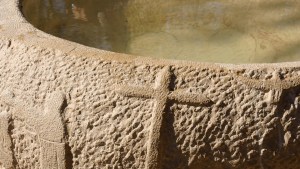Everyone then who hears these words of mine and acts on them will be like a wise man who built his house on rock. The rain fell, the floods came, and the winds blew and beat on that house, but it did not fall, because it had been founded on rock.
And everyone who hears these words of mine and does not act on them will be like a foolish man who built his house on sand. The rain fell, and the floods came, and the winds blew and beat against that house, and it fell—and great was its fall!” (Matthew 7, 24-27)
Reflection
When we think of a house, we think of stability. A house is something definitive, lasting, enduring. It is the place where memories are made. When we recall the house we grew up in, long childhood summers seem endless, the house being the always-present background sheltering all our early, formative experiences —both good and bad: our first fistfight, our first kiss, friends we made, friends we lost.
However, chances are our childhood home is not there anymore. Those old memories no longer belong to an actual place one can go back to. The streets vanished. The building was condemned, the house sold or demolished, the tree chopped down. Our friends are scattered around the world, and our parents might not be among the living. That is, after all, how life is. People move elsewhere. Cities change. Towns either grow or disappear.
Sooner rather than later, houses prove to be not that definitive anymore. Those who have suffered war, tragedy, displacement, homelessness, migration, know all too well that lifelong memories cannot depend on whether there is an actual something (the house, the tree, the block) that reminds us of who we are, and of those we love and have loved.
We all have to make the deliberate effort to remember while moving on. We might find ourselves dwelling in places we are not supposed to dwell in anymore. Just like our lives are filled with memories, they are also made out of habits. It is revealing to realize the word habit and habitation are indeed etymologically related. We are what we do —even more so, we are what we are used to doing.
May this reading be a constant reminder that habits, like houses, can either be permanent (built on a rock) or temporary (built on sand). Taking our good habits for granted, and hoping our bad habits will just fade away, is naïve and (these are the hard words of the Gospel) foolish. As with memories, a deliberate effort to preserve ones and get rid of others is necessary. It is not only a matter of listening, but of acting accordingly.
Prayer
Stir up your power, O Lord,
and come to our help with mighty strength,
that what our sins impede
the grace of your mercy may hasten.
Through our Lord Jesus Christ, your Son,
who lives and reigns with you in the unity of the Holy Spirit,
God, for ever and ever.




